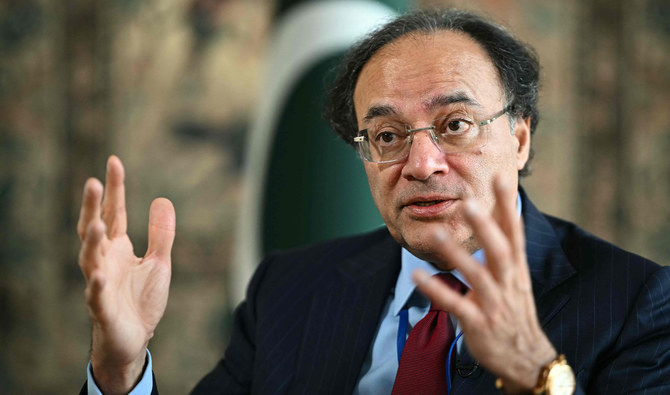Washington: Pakistan has initiated discussions with the IMF over a new multi-billion dollar loan agreement to support its economic reform program, its new finance minister told AFP on Monday.
The South Asian nation is nearing the end of a nine-month, $3 billion loan program with the International Monetary Fund designed to tackle a balance-of-payments crisis which brought it to the brink of default last summer.
With the final $1.1 billion tranche of that deal likely to be approved later this month, Pakistan has begun negotiations for a new multi-year IMF loan program worth “billions” of dollars, Finance Minister Muhammad Aurangzeb said during an interview in Washington.
“The market confidence, the market sentiment is in much, much better shape this fiscal year,” said Aurangzeb, a former banker who took up his post last month.
“It’s really for that purpose that, during the course of this week, we have initiated the discussion with the Fund to get into a larger and an extended program,” he added.
An IMF spokesperson told AFP that the Fund is “currently focused on the completion of the current Stand-by Agreement program,” referring to the ongoing nine-month program scheduled for completion shortly.
“The new government has expressed interest in a new program, and Fund staff stands ready to engage in initial discussions on a successor program,” the spokesperson added.
During his visit to Washington, Aurangzeb will also attend the spring meetings organized by the IMF and World Bank, which kick off in earnest Tuesday, with two clear objectives: to help countries combat climate change, and to assist the world’s most indebted nations.
The meetings — which bring central bankers together with finance and development ministers, academics, and representatives from the private sector and civil society to discuss the state of the global economy — will kick off with the IMF’s publication of its updated World Economic Outlook.
Pakistan held elections in February this year which were marred by allegations of rigging, with opposition leader Imran Khan jailed and barred from running, and his Pakistan Tehreek-e-Insaf (PTI) party subject to a crackdown.
The shaky coalition that emerged, led by Shehbaz Sharif, is now tasked with engineering an economic turnaround by implementing a raft of unpopular belt-tightening measures.
“I do think that we will at least be requesting for a three year program,” Aurangzeb said. “Because that’s what we need, as I see it, to help execute the structural reform agenda.”
“By the time we get to the second or third week of May, I do think we’ll start getting into the contours of that discussion,” he added.
Pakistan has close economic ties to both the United States and China, which has put it in a tricky position as the two countries have embarked upon a costly trade war.
“From our perspective it has to be an and-and discussion,” Aurangzeb said when asked how the Sharif government plans to conduct its trading relationships with the world’s two largest economies.
“[The] US is our largest trading partner, and it has always supported us, always helped us in terms of the investments,” he said. “So that is always going to be a very, very critical relationship for Pakistan.”
“On the other side, a lot of investment, especially in infrastructure, came through CPEC,” he said, referring to the roughly 1,860-mile long China-Pakistan Economic Corridor designed to give China access to the Arabian Sea.
Aurangzeb said there was an “very good opportunity” for Pakistan to play a similar role in the trade war as countries like Vietnam, which has been able to dramatically boost its exports to the US following the imposition of tariffs on some Chinese goods.
“We have already a few examples of that already working,” he said. “But what we need to do is to really scale it up.”
As part of the structural reform program agreed to by the previous government, Pakistan is in the middle of a privatization drive to sell off its poorly-performing state-owned enterprises (SOEs).
The first SOE on the list is Pakistan International Airlines, the country’s flag carrier.
“We will get to know in the next month or so with respect to interest from prospective bidders,” Aurangzeb said.
“Our desire is to go through with that privatization and take it through the finishing line by the end of June,” he added.
If the PIA privatization goes well for the government, other companies could soon follow.
“We’re creating an entire pipeline,” he said, adding: “Over the next couple of years we want to really accelerate that.”
















